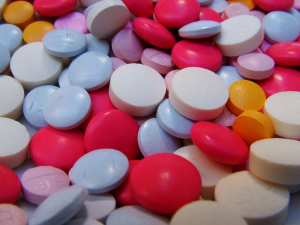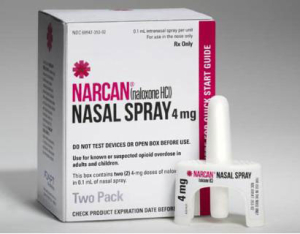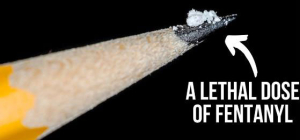From Alcohol to Fentanyl
By Kevin Kufeldt, Chapter Co-Chair at Mission Trail Middle School for Father’s Club
(Kevin Kufeldt is the Director of Addiction and Residential Services with Johnson County Mental Health and is an authority in the area of drug addiction and its impact on our community. He’s also the co-chair of the Mission Trail Middle School Father’s Club.)
 In 2020, the nation was facing an opioid pandemic, but if you looked around Johnson County it was difficult to see. The Midwest was not experiencing the same devastating numbers of overdoses/deaths we saw on the national news. Life-saving medications were not being discussed in the schools, libraries, treatment centers or other public arenas. County leaders, probation officers, judges and the district attorney office were calling my office and asking, “What is all of this talk on opioids and are you seeing it in your treatment facilities?”
In 2020, the nation was facing an opioid pandemic, but if you looked around Johnson County it was difficult to see. The Midwest was not experiencing the same devastating numbers of overdoses/deaths we saw on the national news. Life-saving medications were not being discussed in the schools, libraries, treatment centers or other public arenas. County leaders, probation officers, judges and the district attorney office were calling my office and asking, “What is all of this talk on opioids and are you seeing it in your treatment facilities?”
The answer to their question, back then, was a confident, “No! We’re not seeing the effects of opioids in our community or even the state.”
A review of admission data at the Adolescent Center for Treatment revealed that only 7.5 percent of the youth entering residential treatment were diagnosed with an opioid used disorder as their primary or “drug of choice.” The number of youth reporting any use of opioids was roughly 23 percent.
Alarming Increases
 We compare those numbers to 2023 statistics and see that the percentage of youth seeking services at the Adolescent Center for Treatment with a primary diagnosis of opioid use disorder rising to 30 percent, with roughly 59 percent of youth reporting that they have been using opioids on a regular basis. Alarming increases over just a three-year period. The more we learn about these numbers increasing, though, the more we are learning about ways to combat the sometimes-deadly ramifications.
We compare those numbers to 2023 statistics and see that the percentage of youth seeking services at the Adolescent Center for Treatment with a primary diagnosis of opioid use disorder rising to 30 percent, with roughly 59 percent of youth reporting that they have been using opioids on a regular basis. Alarming increases over just a three-year period. The more we learn about these numbers increasing, though, the more we are learning about ways to combat the sometimes-deadly ramifications.
Youth entering into Johnson County Mental Health’s outpatient addiction services program and the Adolescent Center for Treatment continue to voice concerns for the potency of counterfeit opioids, but they continue to purchase and abuse this potentially life-threatening drug.
Providers in the area are referring more and more clients to medically assisted treatment providers (MAT) in an effort to provide therapeutic dosages of opioid blocking medications to better assist users in treatment/recovery. These medications not only block the opioid receptor sites in the individual’s brain, but they also provide relief from withdrawal symptoms and assist with deterring cravings toward a return to use.
Education
 In addition to providing medication options for those using/abusing opioids, Clients are being educated on harm reduction strategies to help curb the overdose potential of unsuspecting users of Fentanyl. Harm reduction strategies are not a cure for opioid used disorder and despite some of its negative attention in the community does not encourage continued use.
In addition to providing medication options for those using/abusing opioids, Clients are being educated on harm reduction strategies to help curb the overdose potential of unsuspecting users of Fentanyl. Harm reduction strategies are not a cure for opioid used disorder and despite some of its negative attention in the community does not encourage continued use.
Treatment providers in outpatient services are providing clients with individual dosages Narcan medications. Narcan or Naloxone is a medication that rapidly reverses an opioid overdose. As an opioid antagonist, this medication attaches to the opioid receptors and reverses the effects of the opioids in the individual’s system and quickly restores the user back to normal breathing. The use of Narcan can be performed by anyone, is not dangerous to administer or inhale and has proven to be successful in save the lives of many clients. It is important to always call 911 for any person requiring life saving measures.
Opioids and Fentanyl are a deadly combination. It only takes two milligrams (the equivalent of a few grains of salt) to cause an overdose in a grown adult. Counterfeit pills flowing throughout our community of Johnson County places each and every one of us in danger should one of these pills be ingested. It’s extremely important that you talk to your family and friends about never taking any medication that were not prescribed by your doctor and filled in your local pharmacy.
This is yet another reason why the role of the Father’s Club is so important at both the middle school and the high school level. Being present in the lives of these kids is the first step in getting out in front of this big problem.
For additional information on opioids or substance use disorder, feel free to reach out to Kevin Kufeldt, Director of Addiction and Residential Services with Johnson County Mental Health or call him at 913-715-7639.
To get involved with a Father’s Club chapter at your school, visit the Chapters page on our website.

Leave a Reply
Want to join the discussion?Feel free to contribute!